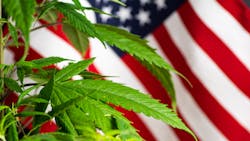The U.S. Drug Enforcement Administration announced this morning that it will not change the Schedule I status of cannabis under the Controlled Substances Act. The DEA’s decision, which has been anticipated for months, puts to rest any speculation about an immediate change in the federal position on cannabis. It also raises questions about the transparency of the DEA, which offered scant evidence and little justification for its decision.
DEA spokesman Rusty Payne told Leafly on Thursday morning that the agency is “bound by statute, by the law. We enforce the laws on the books.”
“Congress can change the law through the legislative process, or if the FDA says it should be a medicine,” Payne added.
The decision itself came cloaked within a Federal Register announcement about a slight expansion in the government’s program that licenses the production of cannabis for research purposes. Within that announcement, the DEA stated:
“Marijuana has no currently accepted medical use in treatment in the United States. Based on the established five-part test for making such determination, marijuana has no ‘currently accepted medical use’ because: As detailed in the HHS evaluation, the drug’s chemistry is not known and reproducible; there are no adequate safety studies; there are no adequate and well-controlled studies proving efficacy; the drug is not accepted by qualified experts; and the scientific evidence is not widely available.”
The DEA’s Payne told Leafly: “There’s clearly a need for more growers to be allowed to grow” for research purposes. “The science can change, and there’s a lot of promise with CBD. Hopefully, [this change in DEA policy regarding licenses to grow] will pave the way for more research, innovation, and potential.”
Legalization and medical cannabis advocates around the country reacted with outrage, though few were surprised by the DEA’s decision not to reschedule. Rep. Earl Blumenauer (D-OR) described the decision as “further evidence that the DEA doesn’t get it.” He continued:
“Keeping marijuana at Schedule I continues an outdated, failed approach — leaving patients and marijuana businesses trapped between state and federal laws. This decision does not address other key concerns like the need for banking services and tax equity for small businesses, operating legally in half the states. It’s not right or fair.”
Michael Collins, deputy director of national affairs for the Drug Policy Alliance, said the decision “shows that the DEA continues to ignore research, and places politics above science. In reality, marijuana should be descheduled and states should be allowed to set their own policies.”
Prohibition defenders, meanwhile, hailed the DEA’s decision as prudent and wise. “They’re looking at the science, taking a nuanced view,” Kevin Sabet, founder of the anti-legalization group Smart Approaches to Marijuana, told the New York Times. “It’s a good day for science,” he added.
Shop highly rated dispensaries near you
Showing you dispensaries nearIt was unclear whether Sabet was referring to the refusal to reschedule or to the DEA’s decision to end the University of Mississippi’s monopoly on cannabis grown for research. According to today’s announcement, the agency will now consider applications for a federal grow license from “any institution that has an approved research protocol and the security measures needed to store dangerous drugs.”
That’s a small step forward. For decades, the National Institute on Drug Abuse has contracted with botanists at the University of Mississippi to grow the nation’s only supply of cannabis for research. In any other field, the NIDA cannabis would be described as “research grade,” but the product coming out of Mississippi has been of such poor quality as to be nearly useless to researchers.
“This policy is a step forward but it’s way less than meets the eye,” Rick Doblin told Leafly Thursday morning. Doblin is the founder of MAPS, the Multidisciplinary Association for Psychedelic Studies, which has been fighting for years to break NIDA’s monopoly on research-grade cannabis.
“The DEA has not fully ended the NIDA monopoly if the new licenses are only going to universities, and only to universities that are also already in possession of an approved protocol,” Doblin added. “This is a half-measure supported by Kevin Sabet, but if the restrictions are as stated, it’s not the real end of the NIDA monopoly.”
Today’s decision may mark a pivot point in the legalization movement: the day when advocates abandoned the idea of reforming through the DEA. Bill Piper, national affairs director for the Drug Policy Alliance, saw the decision as a gift to organizers and lobbyists like himself:
From organizing perspective, DEA decision 2 not reschedule marijuana practically a gift 2 those of us working 2 end drug war and reform DEA
— Bill Piper (@billjpiper) August 11, 2016
Header photo by AP









